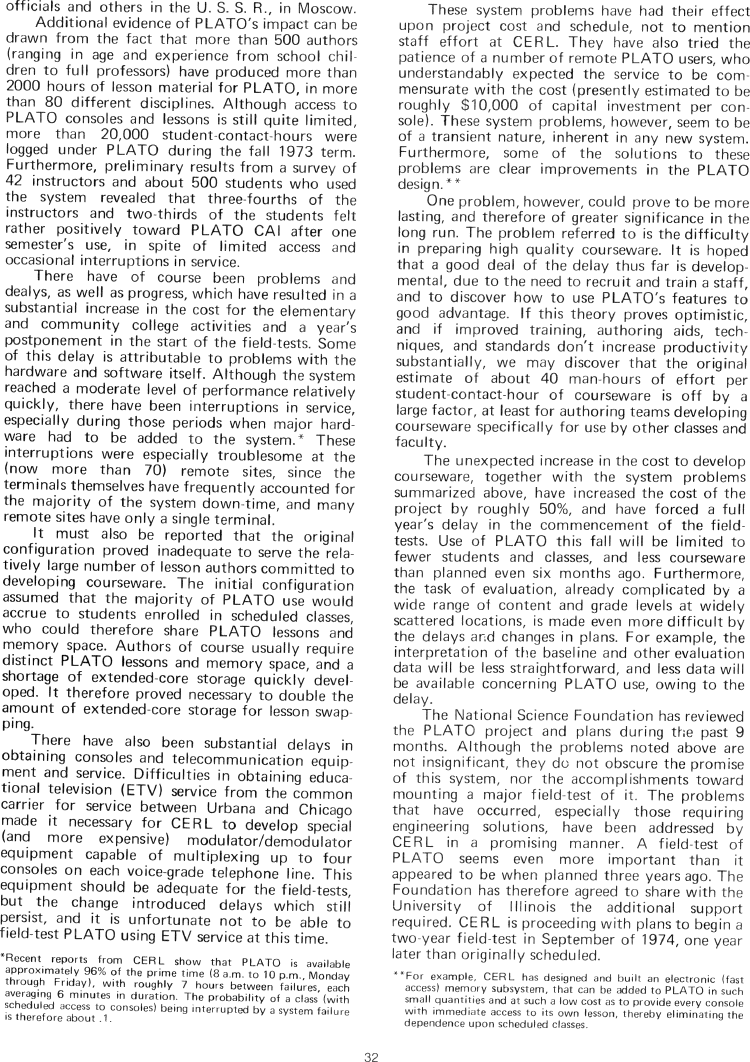The Best of Creative Computing Volume 1 (published 1976)
PLATO IV System Progress Report on Field Testing

officials and others in the U. S. S. R., in Moscow.
Additional evidence of PLATO's impact can be
drawn from the fact that more than 500 authors
(ranging in age and experience from school children to full professors) have
produced more than 2000 hours of lesson material for PLATO, in more
than 80 different disciplines. Although access to
PLATO consoles and lessons is still quite limited,
more than 20,000 student-contact-hours were
logged under PLATO during the fall 1973 term.
Furthermore, preliminary results from a survey of
42 instructors and about 500 students who used
the system revealed that three-fourths of the
instructors and two-thirds of the students felt
rather positively toward PLATO CAI after one
semester's use, in spite of limited access and
occasional interruptions in service.
There have of course been problems and
dealys, as well as progress, which have resulted in a
substantial increase in the cost for the elementary
and community college activities and a year's
postponement in the start of the field-tests. Some
of this delay is attributable to problems with the
hardware and software itself. Although the system
reached a moderate level of performance relatively
quickly, there have been interruptions in service,
especially during those periods when major hardware had to be added to the
system.* These
interruptions were especially troublesome at the
(now more than 70) remote sites, since the
terminals themselves have frequently accounted for
the majority of the system down-time, and many
remote sites have only a single terminal.
It must also be reported that the original
configuration proved inadequate to serve the relatively large number of lesson
authors committed to
developing courseware. The initial configuration
assumed that the majority of PLATO use would
accrue to students enrolled in scheduled classes,
who could therefore share PLATO lessons and
memory space. Authors of course usually require
distinct PLATO lessons and memory space, and a
shortage of extended-core storage quickly developed. lt therefore proved
necessary to double the
amount of extended-core storage for lesson swapping.
There have also been substantial delays in
obtaining consoles and telecommunication equipment and service. Difficulties in
obtaining educational television (ETV) service from the common
carrier_for service between Urbana and Chicago
made it necessary for CERL to develop special
(and more expensive) modulator/demodulator
equipment capable of multiplexing up to four
consoles on each voice-grade telephone line. This
equipment should be adequate for the field-tests,
but the change introduced delays which still
persist, and it is unfortunate not to be able to
field-test PLATO using ETV service at this time.
*Recent reports from CERL show that PLATO is available
approximately 96% of the prime time (8 a.m. to 10 p.m., Monday
through Friday), with roughly 7 hours between failures, each
averaging 6 minutes in duration. The probability of a class (with
scheduled access to consoles) being interrupted by a system failure
is therefore about .1.
These system problems have had their effect
upon project cost and schedule, not to mention
staff effort at CERL. They have also tried the
patience of a number of remote PLATO users, who
understandably expected the service to be commensurate with the cost (presently
estimated to be
roughly $10,000 of capital investment per console). These system problems,
however, seem to be
of a transient nature, inherent in any new system.
Furthermore, some of the solutions to these
problems are clear improvements in the PLATO
design.**
One problem, however, could prove to be more
lasting, and therefore of greater significance in the
long run. The problem referred to is the difficulty
in preparing high quality courseware. It is hoped
that a good deal of the delay thus far is developmental, due to the need to
recruit and train a staff,
and to discover how to use PLATO's features to
good advantage. lf this theory proves optimistic,
and if improved training, authoring aids, techniques, and standards don't
increase productivity
substantially, we may discover that the original
estimate of about 40 man-hours of effort per
student-contact-hour of courseware is off by a
large factor, at least for authoring teams developing
courseware specifically for use by other classes and
faculty.
The unexpected increase in the cost to develop
courseware, together with the system problems
summarized above, have increased the cost of the
project by roughly 50%, and have forced a full
year's delay in the commencement of the fieldtests. Use of PLATO this fall will
be limited to
fewer students and classes, and less courseware
than planned even six months ago. Furthermore,
the task of evaluation, already complicated by a
wide range of content and grade levels at widely
scattered locations, is made even more difficult by
the delays and changes in plans. For example, the
interpretation of the baseline and other evaluation
data will be less straightforward, and less data will
be available concerning PLATO use, owing to the
delay.
The National Science Foundation has reviewed
the PLATO project and plans during the past 9
months. Although the problems noted above are
not insignificant, they do not obscure the promise
of this system, nor the accomplishments toward
mounting a major field-test of it. The problems
that have occurred, especially those requiring
engineering solutions, have been addressed by
CERL in a promising manner. A field-test of
PLATO seems even more important than it
appeared to be when planned three years ago. The
Foundation has therefore agreed to share with the
University of Illinois the additional support
required. CERL is proceeding with plans to begin a
two-year field-test in September of 1974, one year
later than originally scheduled.
**For example, CERL has designed and built an electronic (fast
access) memory subsystem, that can be added to PLATO in such
small quantities and at such a low cost as to provide every console
with immediate access to its own lesson, thereby eliminating the
dependence upon scheduled classes.


